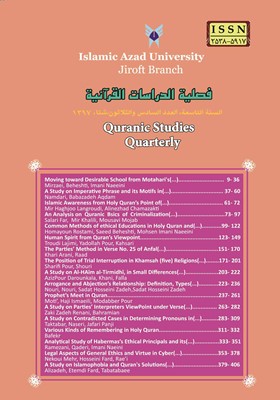Arrogance and Abjection’s Relationship: Definition, Types, Consequences and Treatment from Quran’s Verses Viewpoint
Subject Areas : Quarterly Sabzevaran FadakMahdiyeh Nouri 1 , Mahboobeh Nouri 2 , Samaneh Sadat Hosseini Zadeh 3 , Sediqeh Sadat Hosseini Zadeh 4
1 - PhD Candidate, English Education, Faculty of Foreign Languages, Al Zahra University
2 - Post Graduate, Education Sciences, Islamic Azad University, Science & Research University, Yazd
3 - Post Graduate, English Education, Faculty of Foreign Languages, Kharazmi University
4 - Bachelor, Psychology, Education Sciences and Psychology, Payam – e Nour University, Taft Branch, Yazd
Keywords: قرآن, خداوند, انحطاط, مردم, people, Quran, arrogance, کبر, decadence, Lord,
Abstract :
The aim of the present survey is to study the relationship between arrogance and abjection from Quran’s verses viewpoint. Arrogance which means knowing oneself greatest and the best more than reality, manifests as arrogance in human’s characteristic. The present article which is done in librarian method points out types of arrogance against Lord, against Mohammad the Prophet and against people and also studies the rood of such characteristic. It continues with the consequences of arrogance which result in this world and Hereafter’s abjection, violence and distance from knowledge and wisdom which all are based on Holy Quran’s viewpoint. Finally the article expresses the treatments and advises to cure arrogance.
قرآن کریم.
آمدی، ابو الفتح. بی تا، غرر الحکم ودرر الکلم، قم: انتشارات دار الکتاب الاسلامی.
برخوردار فرید، شاکر. 1389ش، آفات الطلاب، جلد دوم، تهران: انتشارات لاهوت.
خرمشاهی، بهاء الدین. 1366ش، حافظ نامه: شرح دیوان، تهران: انتشارات علمی و فرهنگی.
دستغیب، سید عبدالحسین. 1383ش، گناهان کبیره، جلد دوم، قم: دار الکتاب اسلامی.
رسولی محلاتی، سید هاشم. 1373ش، چهل حدیث، جلد اول، تهران: فرهنگ اسلامی.
رفیعی محمدی، ناصر. 1388ش، گفتار رفیع، جلد دوم، قم: نشر معروف.
سعدی، مصلح الدین عبدالله. 1372ش، بوستان سعدی، تصحیح غلامحسین یوسفی، تهران: خوارزمی.
فرید، مرتضی. 1366ش. الحدیث، روایات تربیتی از مکتب اهل بیت(ع)، جلد1و 2 و 3، تهران: فرهنگ اسلامی.
کلینی، محمد بن یعقوب. 1372ش، اصول کافی، ترجمه و شرح محمد باقر کمرهای، چاپ دوم، تهران: اسوه.
مارانی، حکیمه. 1388ش، تکبر، تهران: مؤسسه علمی سوره.
مجلسی، محمد باقر. 1403ق، بحار الأنوار، محقق و مصحح: جمعی از محققان، جلد 15، بیجا: بینا.
مقالات
حاجیان، طالب و کریمی، مهدی و قهرمانی فرد، علی. 1390ش، «تواضع و فروتنی مدیران از دیدگاه اسلام»، فصلنامه مطالعات اسلامی در تعلیم و تربیت، شماره 4، صص22-1.
خدایی، سیدمهدی و خرقانی، حسن. ۱۳۹۲ش، «شواهد قرآنی روایات باب کبر اصول کافی»، آموزههای قرانی، ش17، صص 27-48.
رضائیان، حسین و ساطوریان، سیدعباس و هراتیان، عباس علی و حسینی مطلق، سیدمهدی. 1395ش، «نقش میانجی صفت حرص در رابطه بین صفات تکبر و حسادت»، اسلام و پژوهشهای روانشناختی، شماره 4، صص 97-85.
قدوسی، سیدابوالفضل و میردریکوندی، رحیم. 1392ش، «بررسی مفهوم روانشناختی کبر در منابع اسلامی و مقایسه آن با خودشیفتگی»، ماهنامه معرفت، شماره 9، صص 93-83.
هراتیان، عباسعلی و آگاه هریس، مژگان و موسوی، الهام. 1392ش، «ساخت و اعتباریابی مقیاس اسلامی تکبر- تواضع»، روانشناسی و دین، ش6، صص 22-5.
هراتیان، عباس علی، ترکاشوند، جواد و جهانگیرزاده، محمدرضا. 1394ش، «رابطه روان بنههای ناسازگار اولیه و ویژگیهای شخصیتی با صفت اخلاقی تکبر»، اسلام و پژوهشهای روانشناختی، شماره1، صص 80-63.
_||_
Ali, M. M. (2011). Holy Quran. Ahmadiyya Anjuman Ishaat Islam Lahore USA.
Amedi, A. (n.d.). Gorrarol-hekam va dorrarol-hekam [The best advices and precious statements]. Qom: Islamic Dar-al-ketab Publications.
Barkhordar farid, Sh. (2010). Afat-al-tollab [The sun of students]. Tehran: Lahout Publications.
Dastgeib, A. (2004). Gonahan-e kabireh [The great sins]. Qom: Islamic Dar-al ketbab Publications.
Farid, M. (1987). Alhadith. The educational verses from the Ahl-al-Beit Maktab. 1, 2, 3. Tehran: Islamic culture Publications.
Hajian, T., Karimi, M., Gharamani fard, A. (2011), tavazo va foroutani modiran az didgah-e eslam [the humility of the managers from the Islamic perspective], 2(4), 1.22.
Haratian, A., Aghah, H., &M., Mousavi, E. (2013). Sakht va etebaryabi meghyas Eslami takabbor-tavazo [The design and validation of the Islamic scale of pride-humility]. Ravanshenasi va Din, 6(4), 5-22.
Haratian, A. a., Torkashvand, J. Jahangir zadeh, M. (2016). Rabete ravan banehaie nasazegar-e avalieh va vizhegi haye shaksiati ba sefat-e akhlaghi takabbor [the relation between the psychological traits of inflexibility and the character with the pride trait], Islam and Psychological Research, 1(1), 63-80.
Khodaei, M. & Kharghani, H. (2013). Shavahede Quranic Revayat-e Bab-e kebr-e Osol-e Kafi [The Quranic documents of the verses around the pride of Osol-e Kafi]. Amouzehaye Quranic, 17.
Khorramshahi, B. (1987). Hafez nameh: sharh-e divan [An exposition to Hafiz verses]. Tehran: The Scientific and Cultural Soroush publications.
Koleini, M. (1993). Osol-e Kafi [Kafi’s principles]. (M. B. Kamrei, trans.) (2nd ed.). Tehran: Osveh Publications.
Majlesi, M. B. (1982). Behar-al-Anvar [The seas of lights] (2nd vol) (P. 150).
Marani, H. (2009). Takabbor [The pride]. Qom: Sureh Scientific Institute.
Ghodousi, S. A., & Mirderikvandi, R. (2013), Baresi mafhoume-e ravanshenakhti-e kebr dar manbe-e eslami va moghayese-e aan ba khod shiftegi [the investigationof of the concept of pride in the Islamic sources and its comparison with Narcissism, the Marefat Monthly, 9(129), 83-93.
Rafie Mohammadi, N. (2013). Goftar-e Rafie [the lofty sayings] (2nd ed.). Qom: Marouf Publications.
Rasouli Mahallati, H. (1994). Chehel Hadith [Forty Hadith]. (1st vol). Tehran: The Islamic culture Publications.
Rezaian, H., Satourian, S. A., Haratian, A., Hosseini motlagh, S. M. (2016). Naghsh-e Mianji sefat-e hers dar rabete bein-e sefat-e takabbor va hesadat [The mediating role of the trait of greed on the relation between the pride and jealousy]. Islam and Psychological research, 2(4), 85-97.
Saadi, M. A. (1993). Bostan [The garden]. (ed. G. H. Yousefi). Tehran: Kharazmi Publications.

